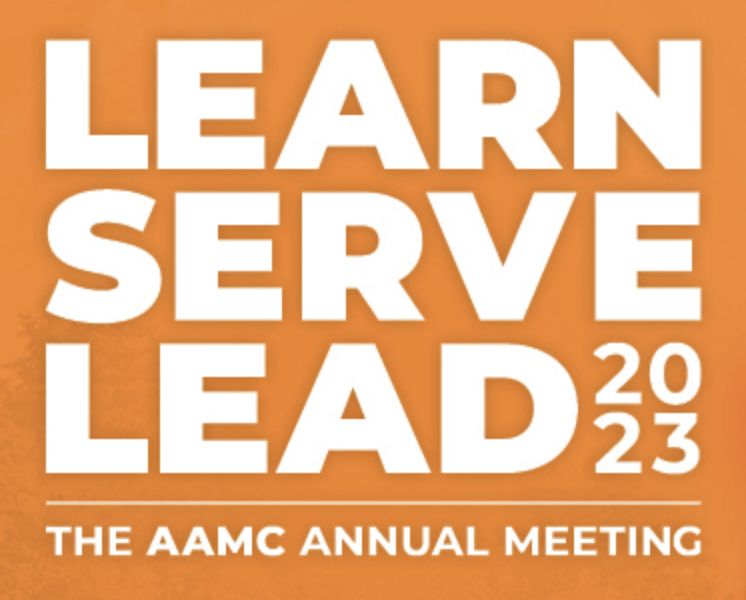 The Association of American Medical Colleges (AAMC) hosted its annual Learn Serve Lead conference Nov. 3-7, 2023. More than 4,500 individuals from across a multitude of medical professions and communities attended the conference in Seattle, Washington. Among these attendees were a cohort of UAB Heersink School of Medicine faculty, staff, and students.
The Association of American Medical Colleges (AAMC) hosted its annual Learn Serve Lead conference Nov. 3-7, 2023. More than 4,500 individuals from across a multitude of medical professions and communities attended the conference in Seattle, Washington. Among these attendees were a cohort of UAB Heersink School of Medicine faculty, staff, and students.
The annual meeting serves as an opportunity to connect with like-minded peers from across the United States to learn from one another, collaborate, and discuss the future of medical education. Caroline Harada, M.D., associate dean for Strategic Initiatives, attended Learn Serve Lead 2023 and graciously agreed to provide insight into the experience.
Dr. Harada noted that many of the attendees were medical educators, but there were also deans, CEOs of health systems, and representatives from the LCME, NBME, and USMLE. The networking potential at this AAMC meeting can be one of its most advantageous factors.
The conference opened on Saturday with a discussion about free speech, even when discussing controversial topics in medical schools. This theme would go on to be reflected in other sessions throughout the weekend. Click here for a summary of this opening plenary.
“I ran into Dr. Christina Grabowski and several others from Heersink School of Medicine,” Harada said. “We were able to discuss the sessions they had attended, in particular many of us were struck by conversations we had all had about the need for us to teach medical students resiliency in order to survive the stresses of this career.”
Harada attended a session on Saturday about creating an anti-racist learning environment. “They introduced a new compendium of curricular materials that will be released in early 2024. This is going to be a great resource for Project AHEAD, as we are always looking for evidence-based teaching materials that are already tested and demonstrated to be effective.”
A unique networking opportunity also presented itself at breakfast on Sunday, as Harada ran into a longtime friend who is now an associate dean for students and runs learning communities at another southern medical school. “I was able to ask her a lot of questions that I had about the role of LC mentors at her institution,” Harada said. “I am thinking about roles our LC mentors can play in better supporting students.”
The Sunday plenary featured Louanne Woodward, the chair of the AAMC board of directors and dean of University of Mississippi Medical Center, who spoke about polarization in the medical education world. She highlighted the intent to have all voices heard, to create safe space where people can debate and disagree. She also discussed health equity and told stories illustrating how much work remains to ensure equal health for everyone. David Skorton, CEO of AAMC, then spoke about how AAMC is supporting DEI in academic medicine through pathway programs, promoting diverse, equitable, and inclusive learning environments. He acknowledged other key issues facing academic medicine: A.I., climate change, misinformation, and threats to free speech.
Sunday afternoon offered a variety of sessions attendees could experience. Harada noted the Learn Serve Lead meeting app was beneficial in determining the sessions that were most relevant or interesting for her. She attended sessions covering the impact of assessment on learners; the opportunities and challenges of Step 1 going pass/fail; and updates for LCME, NBME, and USMLE.
“In the Impact of Assessment on Learners session, the most interesting presentation was from Stanford School of Medicine about differences in clerkship grades between students of different genders and races, with a healthy debate about bias among graders. There was also an interesting presentation on how we evaluate the effectiveness of our preclinical teachers.”
On Monday, the plenary featured Matthew Desmond, professor of sociology at Princeton, who spoke about poverty and its increasing rates within the United States. He highlighted how fees collected from low-income Americans impact the financial support received from the government, and when compared with the tax subsidies afforded to wealthy Americans, the poor receive less overall financial support than the wealthy. “Desmond’s solutions included 1) opposing segregation, removing exclusionary zoning laws; 2) reining in exploitation, supporting labor movements that raise minimum wage; 3) investing in families by rebalancing the safety net. According to Desmond, the cost would be $177 billion per year for the government to eliminate poverty in the United States, which is about the same as goes uncollected in unpaid taxes each year.”
Harada attended sessions on Monday about Pass/Fail clerkships at Southern Illinois University and representation and belonging in the medical education pathway. She also had the opportunity to connect with a mentor from residency. “She is a nationally known DEI expert,” Harada said, “and she was generous enough to sit down with me for a brief, unplanned mentoring session. After interrogating me all about my current role, she helped me think about a few of my challenges, and gave me some valuable perspective. She also gave me the names of a few people she thinks could help us in our DEI work at UAB, and pointed me to some articles I should read to expand my understanding of critical race theory.”
The AAMC Learn Serve Lead conference allows attendees to consider new perspectives regarding issues faced at many institutions around the nation. In addition to the keynote addresses and the hosted breakout sessions, opportunities for impromptu meetings with current and previous peers also present themselves. The ideas delivered and shared throughout the weekend have significant impact on the future of medical education across the United States and beyond.
Click here for more information about the 2023 conference and a look ahead to Learn Serve Lead 2024.
